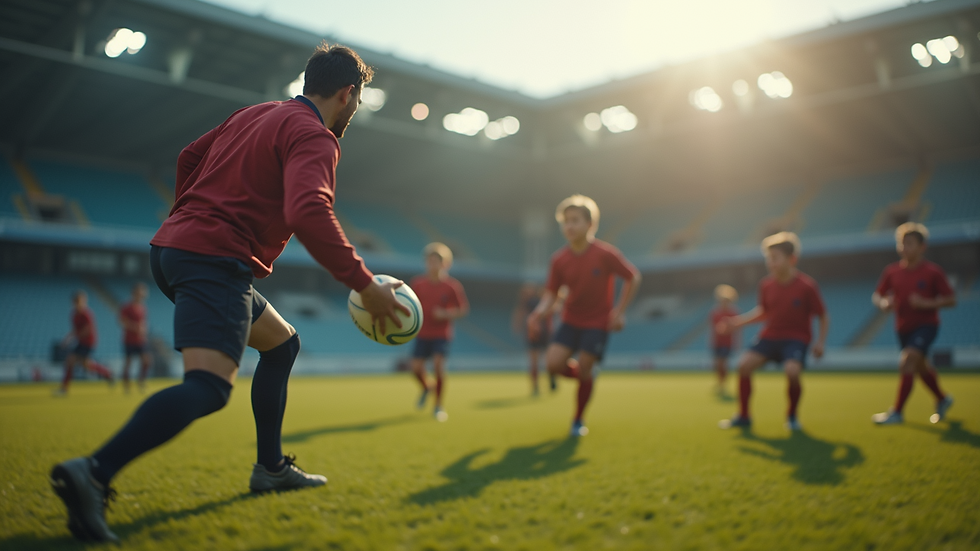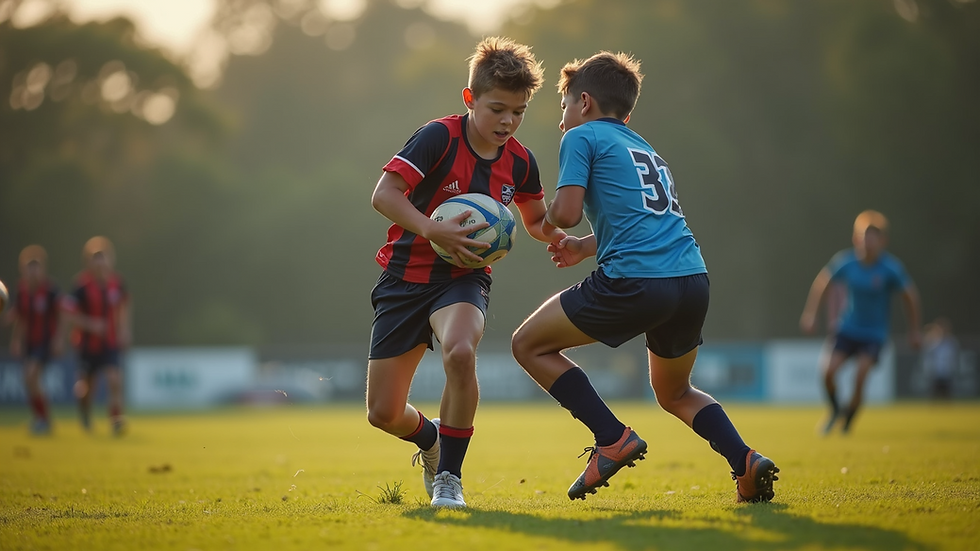Small Group Rugby Sessions for Youth in British Columbia
- Dwayne Kemp
- Aug 7
- 5 min read
Rugby is more than just a sport; it is a way to build character, teamwork, and resilience. In British Columbia, small group rugby sessions for youth are becoming increasingly popular. These sessions provide a unique opportunity for young athletes to develop their skills in a supportive environment.
In this blog post, we will explore the benefits of small group rugby sessions, how they work, and why they are an excellent choice for youth in British Columbia.
The Benefits of Small Group Rugby Sessions
Small group sessions offer numerous advantages over traditional large team practices. Here are some key benefits:
Personalized Attention: With fewer players, coaches can provide more individualized feedback. This helps each player improve their skills more effectively.
Enhanced Skill Development: Smaller groups allow for more focused drills. Players can work on specific skills, such as passing, tackling, and positioning.
Stronger Team Bonds: Smaller groups foster closer relationships among players. This camaraderie can lead to better teamwork on and off the field.
Increased Participation: Youth are more likely to engage in a smaller setting. They feel less intimidated and more comfortable expressing themselves.
Flexible Scheduling: Small group sessions can be scheduled at various times, making it easier for families to participate.
These benefits make small group rugby sessions an attractive option for youth athletes in British Columbia.
How Small Group Sessions Work
Small group rugby sessions typically involve 4 to 10 players. Coaches design these sessions to focus on specific skills and game strategies. Here’s how they usually unfold:
Warm-Up: Each session begins with a warm-up to prepare the body for physical activity. This may include light jogging, stretching, and dynamic movements.
Skill Drills: Coaches lead players through various drills. These drills focus on fundamental skills such as passing, catching, and footwork.
Game Situations: After skill work, players often engage in small-sided games. These mini-games allow players to apply what they have learned in a competitive yet fun environment.
Cool Down: Sessions conclude with a cool-down period. This helps players recover and reflect on what they learned.
Feedback and Discussion: Coaches provide feedback and encourage players to discuss their experiences. This reflection helps reinforce learning.
This structure ensures that players receive a well-rounded experience during each session.
Finding the Right Program
When looking for small group rugby sessions in British Columbia, consider the following:
Location: Choose a program that is convenient for your family. Many clubs offer sessions in various locations.
Coaching Staff: Research the qualifications and experience of the coaches. Look for programs with certified coaches who have a passion for youth development.
Group Size: Ensure the program maintains small group sizes. This is crucial for maximizing individual attention and skill development.
Schedule: Check the session times and frequency. Find a program that fits your family’s schedule.
Cost: Compare prices among different programs. Look for options that provide good value for the quality of coaching and facilities.
By considering these factors, you can find a program that meets your needs and helps your child thrive in rugby.
Success Stories from British Columbia
Many young athletes in British Columbia have benefited from small group rugby sessions. Here are a few inspiring stories:
Emma's Journey: Emma, a 12-year-old from Vancouver, struggled with confidence on the field. After joining a small group session, she received personalized coaching that helped her improve her passing skills. Now, she plays for her local club and has made new friends through rugby.
Liam's Transformation: Liam, a 14-year-old from Victoria, was hesitant to join a team. He started with small group sessions and quickly fell in love with the sport. The supportive environment allowed him to develop his tackling technique. He now plays in competitive matches and enjoys every moment.
These stories highlight the positive impact of small group sessions on youth athletes in British Columbia.
Engaging Parents and Guardians
Parents and guardians play a vital role in supporting their children’s rugby journey. Here are some ways to get involved:
Attend Sessions: Show your support by attending practices and games. Your presence can motivate your child and strengthen their commitment.
Volunteer: Many rugby clubs welcome parent volunteers. You can help with organizing events, managing equipment, or assisting coaches.
Encourage Team Spirit: Foster a positive attitude towards teamwork and sportsmanship. Celebrate your child’s achievements, both big and small.
Stay Informed: Keep up with club news and events. This helps you stay connected with the rugby community and understand your child’s experiences.
By actively engaging, you can enhance your child’s rugby experience and create lasting memories.
The Future of Rugby in British Columbia
The future of rugby in British Columbia looks bright. With the growing popularity of small group sessions, more youth are discovering the joys of the sport. As participation increases, so does the potential for developing talented players.
Rugby clubs are also investing in better facilities and coaching resources. This commitment to youth development will help ensure that the next generation of players is well-prepared for the challenges ahead.
Moreover, the emphasis on inclusivity and diversity in rugby is paving the way for a more welcoming environment. Programs are increasingly focused on making rugby accessible to all youth, regardless of their background or experience level.
Tips for Young Players
For young athletes looking to make the most of their small group rugby sessions, consider these tips:
Stay Positive: Maintain a positive attitude, even when facing challenges. This mindset will help you grow as a player.
Practice Regularly: Outside of sessions, practice your skills. Whether it’s passing against a wall or running drills with friends, consistent practice is key.
Ask Questions: Don’t hesitate to ask your coach for clarification or advice. They are there to help you improve.
Be a Team Player: Support your teammates and celebrate their successes. Rugby is a team sport, and collaboration is essential.
Have Fun: Remember to enjoy the game. Rugby is about having fun and making memories with friends.
By following these tips, young players can enhance their skills and enjoy their rugby journey.
Join the Rugby Community
If you are interested in small group rugby sessions for youth in British Columbia, now is the time to get involved. Many clubs are welcoming new players and offering programs tailored to different skill levels.
Joining a rugby program not only helps develop athletic skills but also fosters friendships and a sense of belonging. The rugby community is known for its supportive atmosphere, making it an excellent place for youth to grow.
Whether your child is a beginner or has some experience, there is a place for them in rugby.

Embrace the Journey
In conclusion, small group rugby sessions offer a fantastic opportunity for youth in British Columbia. They provide personalized coaching, skill development, and a chance to build lasting friendships.
As more young athletes join the rugby community, the sport will continue to thrive in the region. Encourage your child to take the leap and experience the joy of rugby. With the right program and support, they can embark on a rewarding journey that will shape their character and athletic abilities for years to come.
So, lace up those cleats, grab a ball, and get ready to tackle the exciting world of rugby!


Comments